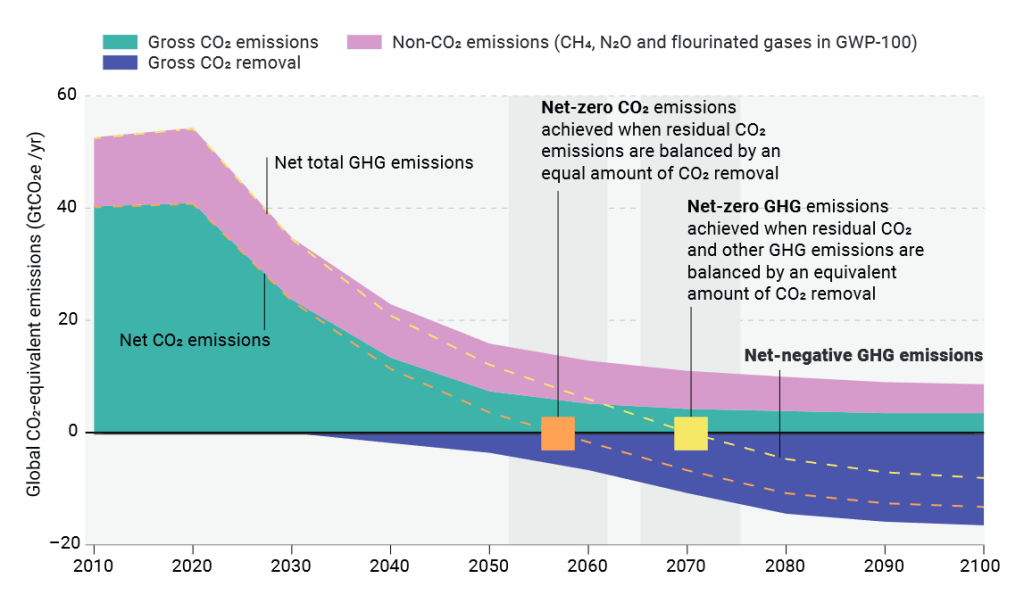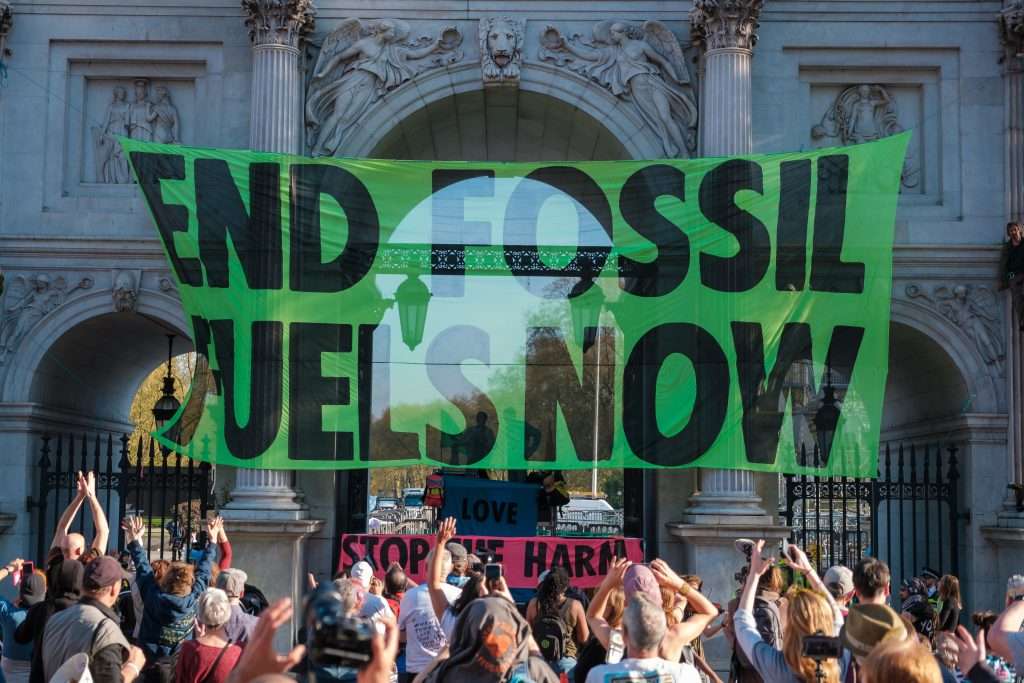What does the UK’s net zero plan entail?
The UK’s Net-Zero Plan aims to reduce harmful emissions and decarbonise all sectors of the UK economy to achieve net zero by 2050. The policies and proposals outlined in the Strategy include:
- Ending the sale of new petrol and diesel cars and vans by 2030.
- Grants to help some households upgrade from gas boilers to low-carbon systems like heat pumps.
- Incentives for farmers to use low-carbon farming methods.
What is the Net Zero Target?
Since the Paris Agreement was signed in 2015 and the Intergovernmental Panel on Climate Change (IPCC) Special Report on Global Warming of 1.5°C was released, several countries have committed to net zero emissions targets. An outcome of this was that 33 countries and the European Union established a goal to meet net zero targets either through legislation or policy documents as of March 2022.
The implementation of national net zero targets plays a critical role in keeping global warming to 1.5˚C. Effectively, this requires carbon dioxide (CO2) and other greenhouse gas (GHG) emissions to decrease to net zero between 2050 and 2070. Thereafter, emissions should decrease to be net-negative.
While many governments, including the UK, have committed to net zero plans, their targets differ. However, certain factors need to be considered to achieve these targets.
- the time-frame,
- GHG emissions covered,
- economic sectors covered,
- whether the country intends to rely on removals and reductions outside its own borders,
- legal status, and other factors.
These factors influence the strength of net zero targets and their ability to contribute sufficiently to achieve global net zero emissions.
What are net zero emissions?
Net zero emissions is a state where total anthropogenic (GHG) emissions and removals become zero while any remaining emissions are re-absorbed from the atmosphere. If Net zero plans are effectively implemented, it could limit global warming to 2.2°C- closer to the well-below 2°C goal of the Paris Agreement. However, the UK, along with numerous other nations, has delayed action until after 2030.

Source: Emissions gap report 202
What’s wrong with the UK’s Net Zero Plan?
Calculations made by the civil servants during the UK court proceedings revealed that the impact of emission cuts from policies in the UK’s Net Zero Plan did not add up to the reductions necessary to meet the sixth carbon budget of the UK. The budget entails the volume of greenhouse gases that the UK can emit during 2033-2037. Two-thirds of this 5 per cent (%) shortfall over the sixth carbon budget is substantial in climate terms. It totals around 75 million tonnes of CO2 emissions. The government did not previously share these figures with parliament or make them available for public scrutiny. The High Court ruling stressed the importance of government transparency and parliamentary accountability in efforts to tackle the climate crisis.
Challenging the UK’s Net Zero Plan
Environmental activists and bodies raised key concerns about the UK’s net zero plan. They called for greater scrutiny of proposals to bring GHG emissions to zero.
Environmental NGOs
Three environmental Non-profit Organisations (NGOs) – ClientEarth, Friends of the Earth and Good Law Project filed separate legal challenges to the UK’s Net Zero Plan earlier this year. The organisations argued that the contents of the plan lacked clarity on how the UK could achieve the net zero targets. Additionally, they pointed out that the Strategy breaches the 2008 Climate Change Act (CCA).
Climate Change Committee
A recent report by the Climate Change Committee (CCC), which tracked the UK’s progress against its Net Zero Strategy, challenged the strategy and highlighted the following:
- Existing policies in the UK do not cover more than a third of the emission reductions needed to achieve net zero.
- Credible plans exist for only two-fifths of the government’s required emissions reductions.
- Around 5 % of the required reductions are “either completely missing or currently clearly inadequate”. Low-carbon farming practices, the UK’s strategy for biomass, energy efficiency in non-fuel-poor homes, and industrial electrification remain a challenge.
- The government has allowed the gap between “future levels of risk and planned adaption” to expand over the last five years.

Image by Ehimetalor Akhere Unuabona
Stakeholder Engagements for Success in net zero plans
The court ruling on the Net Zero Strategy is a reminder of the critical role environmental experts, NGOs, the public sector, private sector and climate change-affected communities need to play to implement net zero plans. Furthermore, state actors must give due consideration to their advice and comments pertaining to environmental governance. Collaborating with key stakeholders can also catalyse each of them to support low-carbon laws.
The following key stakeholders should be involved to achieve effective net zero plans.
Community inclusion
The process for adopting net-zero strategies should include individuals and groups in the climate-affected community. Those in charge of the process need to cover possible impacts of these strategies on communities and how to address people’s concerns. It is therefore necessary to involve farming communities, indigenous peoples, youth and women in these conversations.
Advocates and project beneficiaries
Proponents and project beneficiaries need to create public understanding and acceptance of proposals through providing basic information. Additionally, they must add value to the proposals by considering public input.
Government actors
Meeting global net zero targets requires all governments to significantly strengthen their Nationally Determined Contributions (NDCs). They need to take bold and immediate action toward reducing emissions. Governments can do this by leading the call for action to implement net zero strategies. This would also include promoting the implementation of Principle 10 of the Rio-92 Declaration. Accordingly, it would ensure access to environmental information, participation in decision making, and environmental justice. Furthermore, an effective public sector programme can mean that a proposal is less likely to become controversial further down the line.
NGOs
Feedback from NGOs can provide a useful policy perspective on a proposal. Their views may also be helpful when there are difficulties involving the local people. NGOs have both an obligation and an opportunity to push the development sector toward addressing climate change and decarbonisation. For instance, NGOs can make strategic and tactical decisions based on the experiences of other organisations, both within and outside of the development sector.
The private sector, academia and other interested groups
Governments must seek views from the private sector, academia and other key groups when drafting policies and proposals. One such example is the Race to Zero campaign, which is a global alliance of businesses, investors, universities and cities. The pact has committed to achieving net zero carbon emissions by 2050. By making such a commitment, this alliance is sending a clear message to the the government: they are serious about reducing carbon emissions. This reveals that they are also encouraging a more inclusive and resilient economy.
“We will all suffer much worse effects from environmental crises, if we do not work together to collectively avert them now.”
– UN High Commissioner for Human Rights, Michelle Bachelet.
Importance of net zero
Science continues to warn us that global temperature increase needs to be limited to 1.5°C to prevent the detrimental impacts of climate change. This is achievable if emissions reduce by 45% by 2030 and reach net zero by 2050. Our current trajectory indicates that we will fall far short of achieving these targets.
In recent years, international organisations such as the UN have adopted climate resolutions. The most recent resolution enacted is the declaration of the human right to a healthy environment. This resolution gives hope that countries will accelerate the implementation of their environmental commitments. The resolution aims to help reduce environmental injustices, close protection gaps, and empower people. Monitoring the progress made on this front by countries around the world, including the UK, will provide insight into how seriously this resolution is viewed. This comes at a critical point in human history as we face the worsening effects of climate change and biodiversity loss.
UN High Commissioner for Human Rights, Michelle Bachelet, said in a recent statement that, “to survive and thrive, we must hold governments among other actors accountable for environmental harm, and empower all people to act as agents of change for a healthy environment.”
Towards Net Zero
To keep global warming to no more than 1.5°C – as called for in the Paris Agreement – emissions need to be reduced by 45% by 2030 and reach net zero by 2050.
United Nations, n.d.
The UK government, like all governments, needs to be accountable to its people for the decisions it takes. Realistic and timely legislation is needed to ensure that those they govern, such as businesses, communities, and individuals, are incentivised to reduce carbon emissions. There is an expectation on governments to ensure an inclusive and transparent roadmap for achieving net zero plans.
Governments should also ensure that a balanced participation of all key stakeholders is part of the net zero planning process. This means incorporating vulnerable groups such as youth, indigenous persons, and women into the process. The likelihood of them being more affected by climate policies means they need to be part of the action plan. Those who suffer the most in situations will often be proactively working on solutions. This means they can provide relevant expertise and knowledge in relation to the implementation of net zero strategies.
achieving the United Nations Sustainable Development Goals (SDGs)
Sustainable Development Goal 13 is about climate action. The goal of target 13.2 is to “Integrate climate change measures into national policies, strategies and planning“. The UK’s Net Zero Plan fails to address what is necessary, in terms of carbon emission reductions, in an achievable and timely manner. Not only that, but the government remained opaque in what it shared with the public. In future, the government of the UK must be transparent to all relevant stakeholders, including advocates, NGO’s, and members of the public.
To achieve success, the UK’s Net Zero plan needs to address the shortfall in emissions reduction, whether it be simply through a greater reduction in emissions, or developing ways of absorbing carbon. Creating carbon sinks or investing in carbon capture could achieve this. Both methods of absorbing carbon would provide jobs for people, and through the absorption of carbon, global warming could be reduced, stopped, and potentially reversed.
A Thrivable Framework
THRIVE is passionate about the underlying issues relevant to the integrity of society. Along with sustainability, it investigates issues concerning the judicial process and human rights. THRIVE’s mission is to safeguard human and environmental well-being. The path towards Thrivability involves ensuring that government policies are transparent to and inclusive of all relevant stakeholders.
We at the THRIVE Project, have a framework that aims to use scientific data to allow anyone, from governments to individuals, to track their environmental impact and learn what action can be taken to improve this impact. THRIVE believes that with the right tools, such as the THRIVE Platform, there is a path forward for humanity.
Human happiness can sometimes compete with environmental well-being. The THRIVE Framework’s logo, a Ciambella Chart, demonstrates two boundaries – a social floor – the minimum for an entities survival; and an environmental ceiling – the maximum that can be done to or removed from the environment without causing lasting harm. Humanity must learn to stay within these boundaries to not only survive, but thrive.
Ideas on sustainable living can be gained through viewing podcasts on Sustainable Cities and Sustainable Industries. Webinars are regular and free and you can register here to listen our amazing guest speakers. Please don’t forget to sign up to receive the latest from our #ThrivabilityMatters newsletter.























